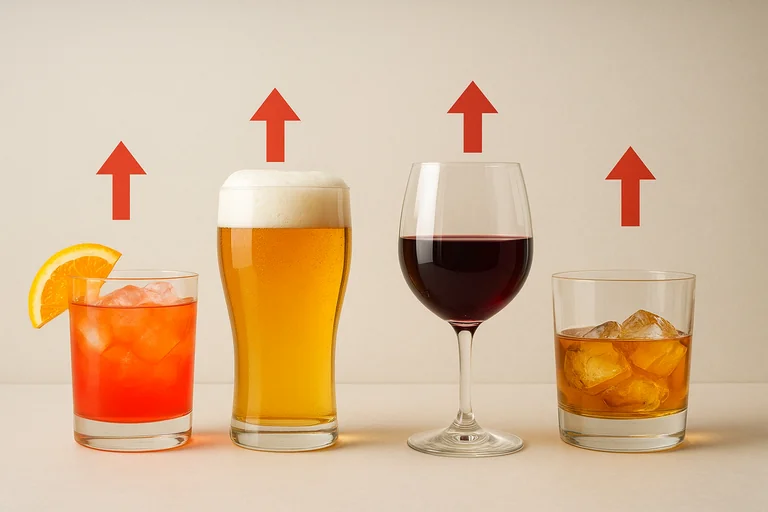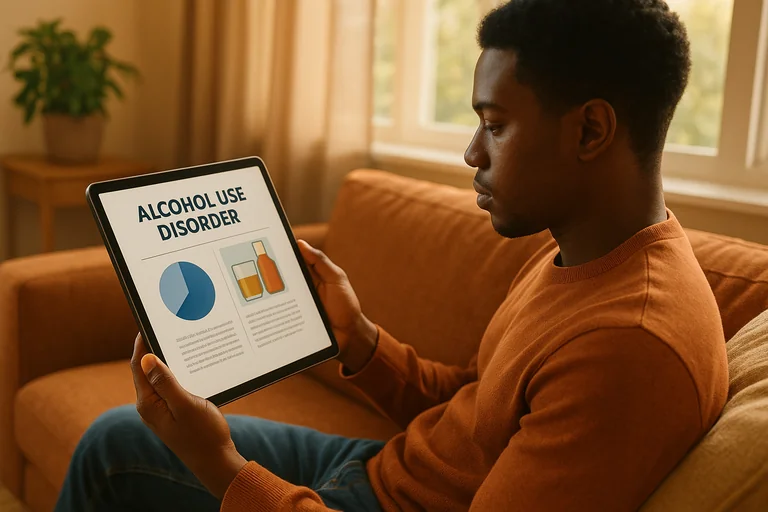A 2 minute assessment to get a personalized mental health or alcohol recovery plan.
You've had a few drinks, and now you're wondering, "How long until I'm sober?" It's a question many of us have asked, and the answer is more complex than you might think. It's not about a cold shower, a cup of coffee, or a greasy meal. It's about science, your body, and time.
What You'll Discover:
- What to do when you need to know exactly how long alcohol stays in your system
- Steps to take to understand blood alcohol concentration and metabolism
- The importance of knowing the truth about sobering up myths and shortcuts
The idea of speeding up the sobering process may be appealing to some people, but it's actually been scientifically impossible for decades. When traditional "quick fix" methods fail repeatedly, causing dangerous misconceptions about sobriety and driving safety, many people assume coffee, cold showers, or food can accelerate alcohol metabolism. With modern understanding of liver function, blood alcohol concentration and other metabolic processes now available, it's actually very straightforward to understand exactly how long it takes your body to process alcohol.
So, how does alcohol metabolism work exactly? It's actually much more precise than you think with your liver doing all the heavy lifting.
Do Your Research About Alcohol Metabolism
Before you begin taking steps to calculate how long you'll need to sober up, it's important to learn about how your body processes alcohol and what affects this timeline. In particular you want to look up information on:
- How your liver metabolizes alcohol at a fixed rate
- What chronic alcohol consumption does to your metabolism
- Why shortcuts to sobering up are dangerous myths that don't work
Medical processes are governed by specific biological factors, and alcohol metabolism is the perfect example. It's not just for people with alcohol use disorder who need to understand processing times. It's also appropriate for people who want to make informed decisions about driving, work responsibilities, and other activities that require complete sobriety.
No matter what your drinking occasion, it's always best to know as much as you can about metabolism timelines before assuming you're safe to drive or operate machinery.
Choose to Understand Blood Alcohol Concentration
The next part takes scientific understanding as well. You'll need to learn how blood alcohol concentration (BAC) works and what different levels mean for your impairment and safety. This is an extremely important concept that goes well beyond just feeling "fine" or "sober enough."
You'll want to make sure that you understand how BAC is measured and what levels are considered legally intoxicated to ensure you make safe decisions about driving and other activities. Experience with alcohol science is also extremely important. Healthcare providers who have been studying alcohol metabolism for years and specialize in addiction medicine are going to be well-equipped to help with accurate information about processing times.
Take an Assessment of Your Drinking and Timing
The approach you choose should help you calculate your specific BAC and sobering timeline based on what and how much you've consumed. This is a crucial part of the process for understanding when you'll actually be safe to drive or make important decisions.
This assessment is a simple yet crucial part of the process for determining what your actual impairment level is and how long complete sobriety will take. It also provides you with baseline information that will be important for making responsible decisions about your activities.
Choose the Right Safety Timeline
If significant alcohol consumption has occurred you can calculate your sobering timeline and plan accordingly for safe decision-making. With evidence-based metabolism science there are proven formulas that help determine exactly when your BAC will return to zero.
Have a Clear Understanding of Liver Function
The most essential step in understanding sobering timelines is learning how your liver processes alcohol at a completely fixed rate. Your liver will:
- Metabolize approximately one standard drink per hour regardless of what you do
- Process 90% of the alcohol you consume through specific enzyme pathways
- Continue working at this rate no matter what sobering "tricks" you try
This will help you understand that there are no shortcuts to the sobering process and that only time allows your liver to complete its work. The liver's processing rate is fixed by biology, not influenced by external factors like cold showers or coffee.
Begin Calculating Your Actual Timeline
After understanding liver metabolism, you'll start calculating your specific sobering timeline based on your consumption and BAC. This involves using the one-drink-per-hour rule and factoring in your individual characteristics like weight and biological sex.
The calculation focuses on giving you an accurate timeline for when you'll actually be sober, not just when you feel better. It's extremely important to use these calculations conservatively, especially when it comes to driving or other safety-critical activities.
Take the Science Seriously
Once you understand how alcohol metabolism actually works you can begin making responsible decisions based on real timelines rather than how you feel. There will be specific guidelines about BAC levels, legal limits, and safety considerations for different activities.
It's extremely important to follow these scientific guidelines exactly rather than relying on subjective feelings of sobriety, particularly when it comes to driving or operating machinery.
Follow-Up to Make Safe Decisions
Having a clear understanding of metabolism science is highly beneficial in ensuring you make responsible decisions about alcohol consumption and subsequent activities. It gives you the knowledge to plan ahead and avoid dangerous situations where you might think you're sober when you're not.
This knowledge can also help you make better decisions about drinking patterns and timing to ensure you're always making safety-conscious choices.
Why Your Body Works Against Quick Sobering Methods
Don't let outdated myths about speeding up sobriety fool you into thinking that coffee, cold showers, or food can reduce your blood alcohol concentration. The criteria for what actually affects alcohol metabolism is clear based on decades of scientific research.
Many emergency physicians, toxicologists and liver specialists will tell you that alcohol metabolism happens at a completely fixed rate determined by liver enzyme production. Even people who feel more alert after coffee or a cold shower still have the same BAC, and it's particularly dangerous because chronic alcohol consumption can create tolerance that makes people feel less impaired while still being legally intoxicated.
Now that you have a better idea of what's actually happening in your liver during alcohol processing, let's delve further into the specific science behind metabolism and why there are no shortcuts to sobriety.
The Undeniable Truth About Alcohol Processing
The undeniable truth is that your liver metabolizes alcohol at a completely fixed rate of approximately one standard drink per hour, and nothing you do can speed up this process. According to Verywell Health, a trusted source of health information, your blood alcohol concentration determines your impairment level and follows predictable patterns.
Your Liver: The Only Sobering Mechanism
Your liver is responsible for processing about 90% of the alcohol you consume through a two-step enzymatic process. It converts alcohol into acetaldehyde (a toxic compound), then breaks that down into harmless acetate.
This process happens at a remarkably consistent rate: about one standard drink per hour. A standard drink equals 12 ounces of regular beer, 5 ounces of wine, or 1.5 ounces of distilled spirits.
If you drink more than one standard drink per hour, your liver can't keep up and the excess alcohol continues circulating in your bloodstream, raising your BAC.
Blood Alcohol Concentration: The Real Measure
Your BAC represents the percentage of alcohol in your blood and determines your actual impairment level:
- 0.02%: Slight relaxation and reduced inhibition
- 0.05%: Noticeably impaired judgment and coordination
- 0.08%: Legal intoxication limit with significantly affected muscle coordination and reaction time
- 0.10%: Slurred speech, poor coordination, and slowed thinking
- 0.15%: Severe intoxication with major loss of muscle control
- 0.40% and above: Life-threatening BAC that can cause respiratory failure
The Scientific Sobering Timeline
Since your liver processes alcohol at a fixed rate, you can calculate sobering time based on your BAC. For example:
- BAC of 0.08%: Approximately 5.3 hours to reach zero
- BAC of 0.15%: Approximately 10 hours to reach zero
These timelines are determined by biology, not by how you feel or what sobering methods you try.
NEED TO KNOW: The only factor that determines how long it takes to sober up is time. Your liver cannot be rushed, and there are no shortcuts that actually reduce your blood alcohol concentration.
What's Most Concerning About Sobering Myths
What's most concerning about common sobering myths is that they can create a false sense of sobriety that leads to dangerous decisions like driving while still legally intoxicated.
The Dangerous Myths That Don't Work
Coffee: Caffeine makes you feel more alert but does absolutely nothing to lower your BAC. You'll be a wide-awake drunk person, not a sober one.
Cold Showers: The shock might make you feel more awake temporarily, but your BAC remains completely unchanged.
Food: Eating after drinking won't speed up metabolism of alcohol already in your system. Food can slow absorption if eaten before drinking, but it can't reverse intoxication.
Exercise: Physical activity might make you sweat, but alcohol isn't eliminated through sweat in meaningful amounts. Your BAC stays the same.
Vomiting: While this removes unabsorbed alcohol from your stomach, it doesn't affect alcohol already in your bloodstream.
These myths persist because they can make you feel more alert or awake, creating the illusion of sobriety while your BAC remains dangerously elevated.
Factors That Influence Your BAC and Sobering Time
While the one-drink-per-hour processing rate is consistent, several factors affect how high your BAC gets initially:
- Biological sex: Women typically reach higher BACs than men after consuming the same amount due to differences in body composition and water content
- Body weight: Larger people generally have lower BACs because they have more blood volume to dilute the alcohol
- Food consumption: Eating before drinking slows alcohol absorption, but doesn't speed up metabolism once alcohol is in your bloodstream
- Age: Older adults may process alcohol more slowly due to decreased liver function
- Liver health: Liver damage significantly slows alcohol metabolism
These factors affect your peak BAC but don't change the fundamental rate at which your liver processes alcohol once you stop drinking.
The Science Behind Fixed Metabolism
Your liver uses two specific enzymes to process alcohol: alcohol dehydrogenase (ADH) and aldehyde dehydrogenase (ALDH). These enzymes work at maximum capacity when you're drinking, creating a metabolic bottleneck.
This enzymatic process cannot be accelerated by external factors. Your liver produces these enzymes at a genetically determined rate that varies slightly between individuals but averages about one drink per hour for most people.
Chronic heavy drinking can increase enzyme production slightly (creating tolerance), but this comes at the cost of liver damage and doesn't significantly speed up acute sobering time.
Making Responsible Decisions Based on Science
Understanding alcohol metabolism science helps you make informed decisions about:
- Driving safety: Never drive until your calculated BAC reaches zero, regardless of how you feel
- Work responsibilities: Plan adequate time before jobs requiring alertness or safety
- Legal situations: BAC determines legal intoxication, not your subjective feelings
- Health decisions: Avoid mixing alcohol with medications until fully metabolized
The key is planning ahead rather than trying to speed up an unchangeable biological process.
When Sobering Knowledge Becomes Recovery Motivation
If you find yourself frequently calculating sobering times or worrying about BAC levels, it may indicate that alcohol is playing too large a role in your life. Constant concern about processing times can be a sign that drinking patterns have become problematic.
Professional support can help you develop a healthier relationship with alcohol that doesn't require constant timing calculations. Medications like naltrexone can reduce cravings and help you drink less, eliminating the need to frequently worry about sobering timelines.
Treatment approaches focus on addressing the underlying patterns that lead to problematic drinking rather than just managing the consequences.
If calculating sobering times has become a regular part of your routine, consider whether it's time to examine your relationship with alcohol more closely. Take our Alcohol Use Assessment to explore whether professional support might help you worry less about metabolism timing.




